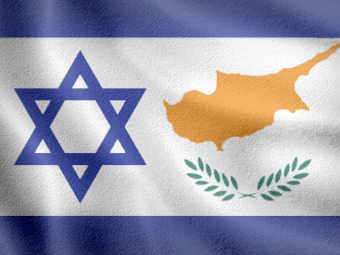Israel's Peripheral Pact
Unnerved by the Arab Spring and estranged from Turkey, Netanyahu sets his sights on the likes of Greece, Cyprus and Azerbaijan.
 One of the more interesting political moves initiated by Israel in recent years has been the strengthening of its ties with countries that are on the periphery of the Middle East. This policy was formulated in light of the ongoing conflict with the Arab world and the relative political isolation of Israel in different arenas. Even before the flotilla incident of May 2010, which has led to an unprecedented low in Turkish-Israeli relations, Israel began building stronger relationships with a number of countries in the "external circle," such as Greece and Azerbaijan. These relations include intelligence cooperation, joint military exercises, and political and economic collaboration.
One of the more interesting political moves initiated by Israel in recent years has been the strengthening of its ties with countries that are on the periphery of the Middle East. This policy was formulated in light of the ongoing conflict with the Arab world and the relative political isolation of Israel in different arenas. Even before the flotilla incident of May 2010, which has led to an unprecedented low in Turkish-Israeli relations, Israel began building stronger relationships with a number of countries in the "external circle," such as Greece and Azerbaijan. These relations include intelligence cooperation, joint military exercises, and political and economic collaboration.
The peripheral policy is an established policy, even if not yet formulated into orderly strategy. The current impact of this policy is limited due to the relative weakness of the countries Israel engages with and due to the major scope of challenges it faces. However, it seems that Israel attaches importance to these relations in light of the possible consequences of the profound changes occurring in the Middle East, specifically the developing chronic instability in some of the Arab states and the strengthening of religious extremists in the region.
This is not Israel's first attempt at breaking its regional isolation and improving its international standing by forging close relationships with non-Arab countries and the various minorities in the region. Israel's initial attempt to form a peripheral pact was in the late 1950s.The first peripheral pact between Israel, Iran, Turkey and Ethiopia (and to a lesser extent, Iraqi Kurds and Christians in Sudan) held for nearly a quarter century, but it did not include formal agreements, and these relations operated generally on a bilateral basis. These relationships were forged when the Arab boycott on Israel was at its peak and pan-Arab tendencies seemed strong. Prime Minister David Ben Gurion promoted the peripheral pact with the encouragement of the United States, which saw it as an anti-Soviet initiative.
On the most basic level, it appears that the renewed thinking about the formation of a peripheral pact stems from the rationale that the "enemy of my enemy is my friend" or, perhaps, "the neighbor of my enemy is my friend." The idea behind the peripheral strategy is more one of containment, derived from an overall view of the balance of power, and less one of a military alliance committed to defense against the aggression of a third party. Thus, perhaps “pact” is the wrong word, although the parties seem to expect assistance, even if limited, in case a violent conflict erupts. Good relations with countries such as Greece, the Republic of Cyprus, Azerbaijan and South Sudan also provide security and intelligence benefits for Israel in three main ways: first, these countries can provide the Israeli Air Force with airspace for essential training; second, these countries can share with Israel useful information; and third, due to their location, these states can serve as an optimal venue for intelligence gathering. Beyond this, Israel sees these evolving relationships as having some potential to pressure Turkey to moderate its harsh stance toward Israel.
Still, the countries Israel currently engages with bring significant weaknesses to the equation. Some are engaged in active conflicts with neighbors. These could pull Israel into new conflicts, thus worsening its strategic situation rather than improving it. Greece suffers from substantial economic and political problems. So does the Republic of Cyprus, whose past relations with Turkey have been characterized by the Turks usually dictating the terms. Ilham Aliyev's regime in Azerbaijan is criticized for its oppression and corruption. Although it relies on oil profits, Azerbaijan has reached the peak of its oil production, and its reserves are now declining. Beyond that, Iran or Turkey could at some point succeed in persuading Azerbaijan to discontinue relations with Israel. South Sudan has re-entered a period of warfare with the North and suffers from serious internal problems that leave it weakened.
In its previous incarnation, the periphery pact remained secretive. Today, these relations are more open, marked by several high-profile visits and visible in some of these countries’ UN voting patterns, which are more favorable to Israel. Furthermore, although these emerging relationships don’t represent a major shift in the regional balance of power, they could help Israel project power during a prolonged conflict.
The current Mideast turbulence raises concerns about the fate of Israel’s peace treaties with Egypt and Jordan and its ability to reach sustainable peace agreements in the future. Instability in some Arab countries is expected to reduce the threat of conventional war in the short term but could unleash asymmetrical threats. As Israel faces a growing regional isolation, it has an incentive to seek alternatives. Strategic relationships with countries in the periphery represent one such alternative.
Gallia Lindenstrauss and Yoel Guzansky are researchers at the Institute for National Security Studies (INSS), Tel Aviv University.
